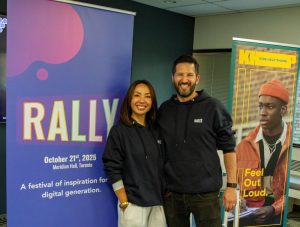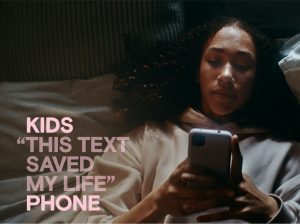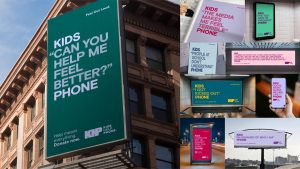Help is the best way to boost mental health and digital wellness among Canadian teens.
And help is the theme fuelling a new national advertising campaign, part of a multi-year, multi-pronged initiative that sees technology and empathy as the best solutions to the mental health crises young people are facing. And not just in Canada, but around the world: as many as one in seven teens globally experiences a mental disorder, often magnified by social media and digital connectivity.
Of course, “Help!” is also one of the many great chart-topping songs by The Beatles.

A new three-minute video that looks at what help really means for and to teenagers in crisis. Still image from KHP video.
The popular tune is now being used as the soundtrack for a new three-minute video that looks at what help really means for and to teenagers in crisis.
Called “Defining Help”, the cinematic production presents a powerful visual portrait of what young people are going through these days, based on their own words and their own descriptions of the impact anxiety, abuse, bullying, poverty, school, social media, technological inclusivity and more has on their lives.
The new video (it launched on channels like YouTube, TikTok, Netflix, and Prime) is part of an on-going initiative from Kids Help Phone, a Canadian service organization that provides free, confidential, and multilingual e-mental health solutions, 24/7.
The charitable organization’s many services include online, phone and text-based chat support, as well as professional counselling, crisis response, and self-directed mental health resources.
“Young people are navigating challenges in ways that the traditional mental health system simply wasn’t built for. At KHP, we know that responsive, inclusive and innovative support isn’t optional – it’s essential,” Justin Scaini, KHP’s Group Head and Executive Vice President, Strategy, Innovation and Transformation, said. “Our approach is driven by bold innovation, grounded in clinical expertise, and built with safety at its core – because that’s what young people deserve.
“Young people connect with us across a wide spectrum of needs: some in moments of acute crisis, and others to process stress, identity, or relationships,” he described, adding that through those connections, “youth tell us in their own words that help looks different for each of them.”
Help can look different online and in-person, too, so Kids Help Phone is a part of what’s being billed as Canada’s first digital wellness festival for Gen Z, a special live event in which thousands of young people are participating.
This coming Tuesday, October 21, RALLY 2025 is set to take over Meridian Hall in downtown Toronto. Organizers plan to welcome more than 3,000 high school students, teachers, and community leaders. KHP is one of the many supporters and participants in the event.
Designed for teens (ages 13 to 18), RALLY aims to blend inspiration, entertainment, and straight-up talk about digital habits, mental health, identity, and life online.

Promoting youth mental and digital health, the founders of RALLY 2025 received support from the Kids Help Phone charity. KHP image.
Co-founded by Keith Wallace (formerly of the Collision Conference) and Brigitte Truong (a tech presenter and media personality), the upcoming RALLY 2025 live event will hopefully empower young people to participate in, even get out front and lead, a movement all about healthy digital habits and strong offline connections.
The event will focus on key themes including Mental Health & Digital Wellness; Digital Citizenship & Media Literacy; and Social Impact & Community.
As well as topical talks from influencers and experts, students can explore interactive zones and participate in hands-on workshops.
The in-person event is made possible by founding partner Kids Help Phone, and supported by TELUS, Snapchat, the City of Toronto, and CIRA (Canadian Internet Registration Authority).
In its many other activities, Kids Help Phone organizers say they want to tackle youth mental health with solutions that blend technology with empathy, providing support however and wherever it’s needed, understanding that the issues young people face come faster than ever these days.
Over just the past five years, KHP has connected with young people more than 22 million times, a stat that underscores the wide range of reasons young people reach out – from daily emotional challenges to urgent existential crises.
According to Kids Help Phone data, calls about suicide among youth 13 and under have more than doubled over the past four years; conversations about sexual abuse increased by 28 per cent between 2023 and 2024; and Black and Indigenous youth are accessing KHP’s services at a rate disproportionate to their population.
Other topics include the loss of a parent, porn addiction, self-harm, economic pressures, identity challenges, and more.

The “Defining Help” video and awareness campaign were shaped by the very words young people share with Kids Help Phone hotlines. Still image from KHP video.
Backed by more than 50 million real-time, real-language data points that have been aggregated and anonymized from conversations with youth, the “Defining Help” video and awareness campaign were shaped by the very words young people share with KHP.
The video is but one part of KHP’s on-going mental health fundraising campaign called Feel Out Loud, and its stated intention to raise some $300 million to expand access to Kids Help Phone-mental health services.
For example, KHP has launched Kids Help Phone Insights, a first-of-its-kind data platform sharing real- time information about issues concerning to young people. By analyzing data from social media platforms, by examining public conversations among young people on social media (not just those using KHP services), the charity says it can better identify youth mental health trends.
KHP also relaunched its Action Plan for First Nations, Inuit and Métis Young People, addressing the fact that last year, Indigenous youth accessed KHP’s services at twice their proportion of the Canadian population, and Black youth at nearly twice their representation.
As well as the new Help video, KHP unveiled another video (actually, a series of eight in English and French) to help kids understand how to recognize and cope with common issues impacting their mental health.
Kids Help Phone has also partnered with U.S.-based tech non-profit Tech Matters to develop Aselo, what it calls a contact centre platform designed by and for health counsellors. The platform was developed to streamline counsellors’ work so more young people can get timely support for any issue or feeling. Context- and word-sensitive machine learning tools will help counsellors identify and prioritize a callers’ needs.
KHP relies on donors, volunteers, stakeholder, corporate and government partners to develop and deliver its many mental health services. Founding partners include Bell Canada and the BMO Financial Group; lead donors on specific initiatives include organizations such as Sun Life and the Ashling Foundation. According to 2024 financial statements, Kids Help Phone received $30.5 million in donations and special events fundraising, and an additional $21.9 million in government funding.
That’s yet another kind of help.
# # #

Over just the past five years, KHP has connected with young people more than 22 million times, a stat that underscores the wide range of reasons young people reach out – from daily emotional challenges to urgent existential crises. KHP images.
-30-



